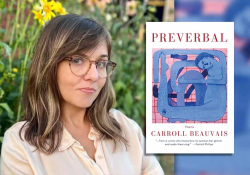Aliens Are Us: Sayaka Murata’s Earthlings
 Readers will naturally and, perhaps, unfortunately, wish to make connections between Sayaka Murata’s (b. 1979) newest novel, Earthlings, translated by Ginny Tapley Takemori (Grove Press, 2021), and her wonderfully quirky Convenience Store Woman (which I previously reviewed for WLT). To be sure, the two novels share a focus on people who live at the margins of a stereotypically conformist Japanese society. Indeed, Natsuki, the protagonist of Earthlings, is waging a long-term battle against “The Factory,” her term for the myriad social expectations and constraints that serve to channel “Earthlings” into the dual roles of productive economic cogs and breeding receptacles for future cogs. She resolutely adopts a lifestyle that rejects such a regimented life and, in so doing, ensures that she will be the locus for society’s ire. That, however, is where the similarities end, and this is why it is well to resist the easy comparison to Murata’s earlier novel. Earthlings is a much darker work, building upon themes that privilege violations of taboos, some quite traumatic, to weave a tale that, in its conclusion, is about as different from Convenience Store Woman in tone as one might imagine. Here, Murata interrogates the transgressive potential of difference, yet we do not sense, in that exploration, the expected condemnations. Rather, we are asked to consider the forces that impinge on those labeled as “different” and how that intersection might occasion a multiplying effect which further marginalizes those who do not hew to society’s norms.
Readers will naturally and, perhaps, unfortunately, wish to make connections between Sayaka Murata’s (b. 1979) newest novel, Earthlings, translated by Ginny Tapley Takemori (Grove Press, 2021), and her wonderfully quirky Convenience Store Woman (which I previously reviewed for WLT). To be sure, the two novels share a focus on people who live at the margins of a stereotypically conformist Japanese society. Indeed, Natsuki, the protagonist of Earthlings, is waging a long-term battle against “The Factory,” her term for the myriad social expectations and constraints that serve to channel “Earthlings” into the dual roles of productive economic cogs and breeding receptacles for future cogs. She resolutely adopts a lifestyle that rejects such a regimented life and, in so doing, ensures that she will be the locus for society’s ire. That, however, is where the similarities end, and this is why it is well to resist the easy comparison to Murata’s earlier novel. Earthlings is a much darker work, building upon themes that privilege violations of taboos, some quite traumatic, to weave a tale that, in its conclusion, is about as different from Convenience Store Woman in tone as one might imagine. Here, Murata interrogates the transgressive potential of difference, yet we do not sense, in that exploration, the expected condemnations. Rather, we are asked to consider the forces that impinge on those labeled as “different” and how that intersection might occasion a multiplying effect which further marginalizes those who do not hew to society’s norms.
Readers are asked to consider the forces that impinge on those labeled as “different” and how that intersection might occasion a multiplying effect which further marginalizes those who do not hew to society’s norms.
Natsuki refers to the people around her as “Earthlings” because she is sure that aliens exist. This knowledge comes from her best friend, a nondescript stuffed animal she calls Piyyut, who tells her that he is from the Planet Popinpobopia, on assignment here by the Magic Police to save Earth. He bestows upon Natsuki certain magical powers that help her survive the daily tribulations she faces, such as the demeaning treatment her mother metes out to her and, as Natsuki puts it to her cousin, Yuu, “Bad magic, monsters, that sort of thing. I’m always doing battle with them to protect the Earth.” Yuu is the person with whom Natsuki is closest, perhaps because he, too, seems receptive to this other world, but that shared fantasy adumbrates a far more transgressive sharing that ultimately rips Natsuki’s extended family apart and separates the two cousins for many years. By the time they reconnect, all Natsuki has is a hopeful resignation that “the Earthlings would succeed in brainwashing” her.
As the novel progresses, we learn that some “bad monsters” inhabit very human bodies, and no amount of extraterrestrial magic can protect Natsuki from their wrenchingly transformative power. She lives with the consequences for over two decades before inadvertently stumbling upon the cure to her inability to taste, a metaphor deployed to signal both sustained damage and protective reaction. It is only when Natsuki and her asexual husband, Tomoya, flee to her father’s ancestral home deep in the Nagano mountains, “close to the universe” (once again in the company of Yuu), to fully embrace their lives as Popinpobopians that she regains her sense of taste. The cost of this restoration is a further horrific violation of one of society’s most deeply held taboos, itself a consequence of the violation of a third major taboo many years earlier by Natsuki. Of course, the three are now living as the aliens they truly are, wholly free from the restrictions and conventions limiting the Earthlings with whom they reluctantly share the planet, rendering such concerns moot.
Alas, the fantasy could not continue, which gives Earthlings a decidedly less optimistic ending than the earlier Convenience Store Woman, and one that leaves the reader wanting. The weakness of the dénouement is largely due to its precipitous descent into an unsuccessful burst of magical realism. Perhaps we are to see this as the ultimate protection Natsuki obtains from the long-silent Piyyut, or it may be an effort to accentuate just how absurd it is for society to judge difference as severely as it does. Perhaps it is more mundane, signaling that Natsuki will be “dragged back into the Earthing’s world.” Whatever the intention, it remains unrealized, and this may, in fact, be the perfect ending to a novel about the difficulty of fitting in.
Those oddities we remark in others may very well be substantially more broadly dispersed throughout the population than we may believe or even wish.
Ginny Tapley Takemori has, once again, crafted an eminently readable translation of Murata’s work. She includes an afterword by Murata in which the author confesses to sharing with her protagonist a secret life of space travel. Although it may be tempting to read this as an autobiographical hint—and it may be such—it is much more profitable to understand this revelation as an expression of support for difference, a recognition that those oddities we remark in others may very well be substantially more broadly dispersed throughout the population than we may believe or even wish. In this, Murata reinforces the central message of Earthlings: people are diverse, and ignoring that diversity comes at an unknowable cost to both the individual and society.
On balance, Earthlings is an enjoyable if unsettling read that, once again, asks us to reevaluate what it is to be “normal” and to consider anew how much effort it takes some to learn to be an Earthing. Sayaka Murata is an eloquent voice persuasively arguing for a more tolerant society through the creation of memorable outsiders whose actions by turns beguile, entertain, surprise, and shock. In the best sense, we are left feeling that we would not need the last if only Earthlings were more accepting of those who challenge “The Factory” and better attuned to their motives for doing so.
Bucknell University
When you buy a book using our Bookshop Affiliate link on this page, WLT receives a commission. Thank you for your support!

















